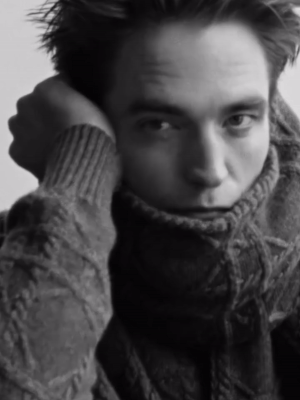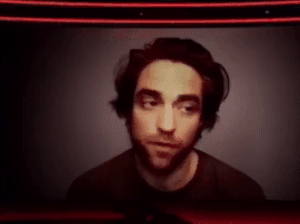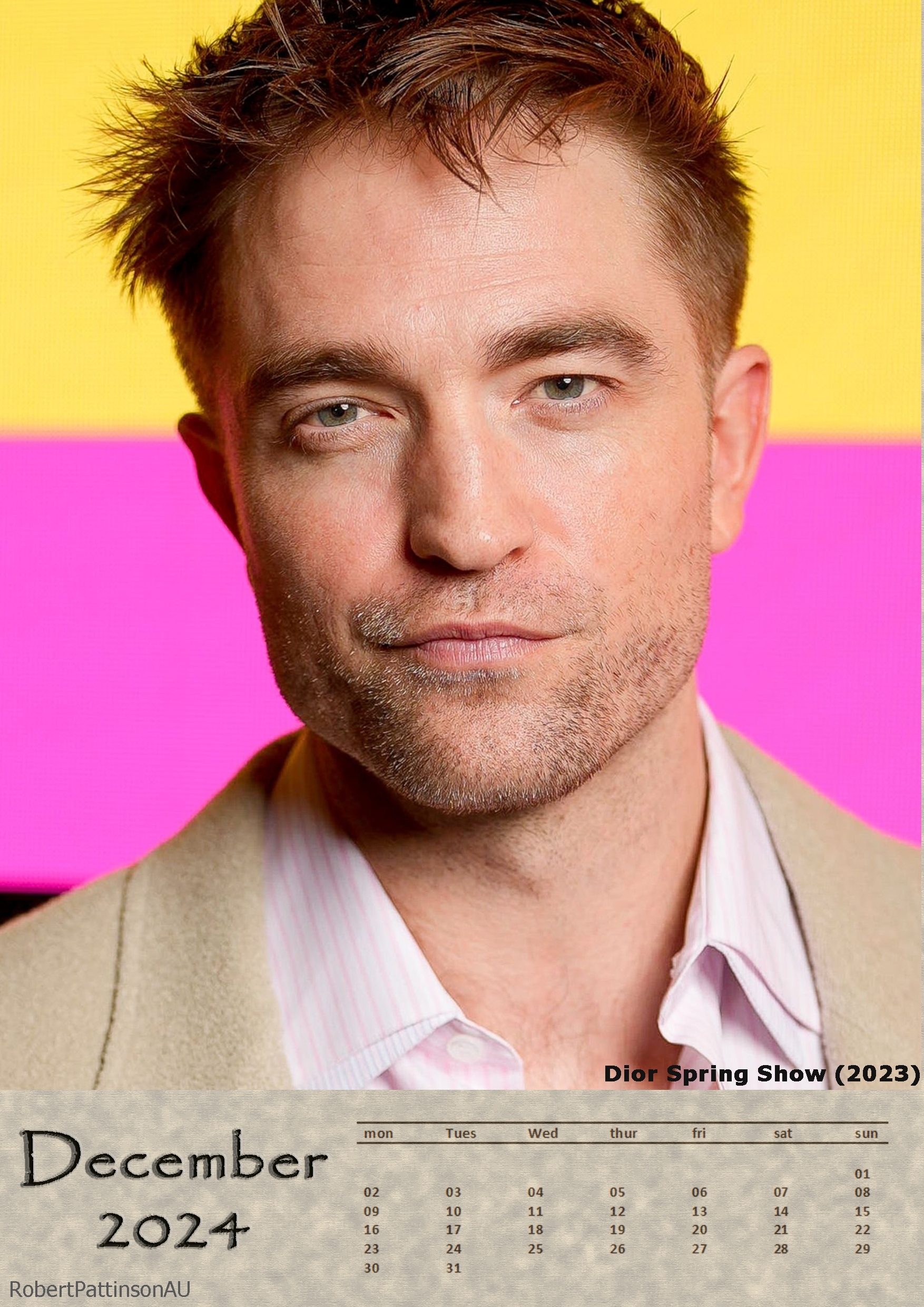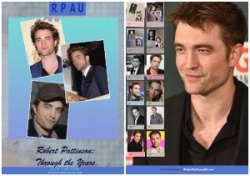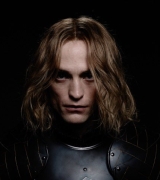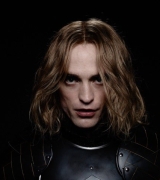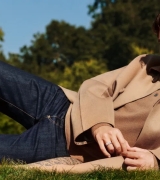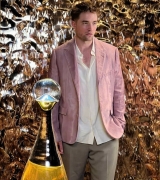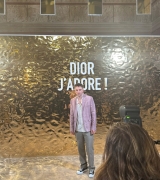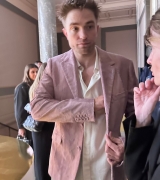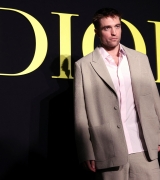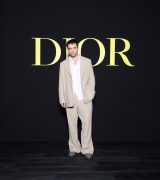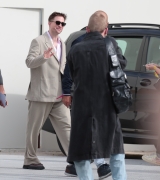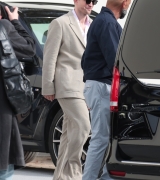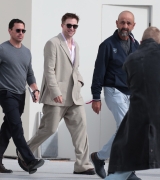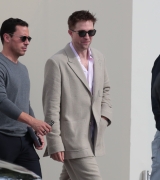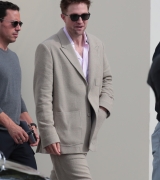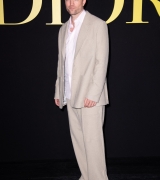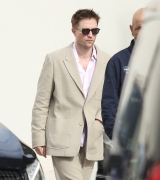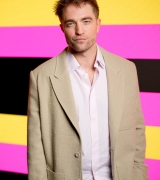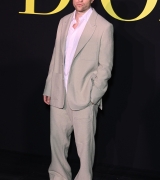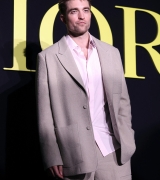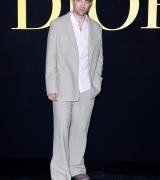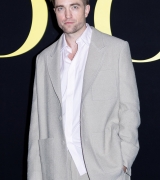
Rob and Claire Denis talk about “the ultimate jail,†the elasticity of language, and their journey into outer space” with Key Chang of Anthem Magazine.
Your films are usually very concretely situated on Earth. This film is set almost entirely on a spaceship in outer space. What were you setting out to explore with High Life?
Claire Denis: Very honestly, I have to say that the most important thing that’s happening between the characters and space is the situation: it’s a death corridor. These people are together forever until they die. There’s no hope to escape, which could happen if you’re in juvie or in jail. Here—it’s outside the solar system and it’s so far that time on Earth is not their time. I’m not scientific, but I learned a little bit. I think the jail thing was important—not space. It’s the ultimate jail, if I can say so. People say that this is a science fiction movie, but I don’t know. I’m not sure about that.This film was several years in the making. You actually made another film [Let the Sunshine In] while this was going on. Since Robert is also here, maybe you could talk about—
Claire: It’s like he’s almost not here. [Laughs]
You had originally envisioned an older character for the story, did you not?
Claire: Yeah, but it’s horrible to say that Robert was not right for it. He was right, probably since the very first minute I met him, but the delay helped me realize that it was even better than this dream about having an older man who’s tired with life and at the end wishing nothing but to die. That was sordid, you know? Robert was bringing something I did not expect. I was a little bit afraid also to be honest—not of his youth, but maybe he was too good-looking. Maybe he was too precious to me like, “I have to be aware of that and not be afraid of his charisma.â€
Robert, do you want to add anything?
Robert Pattinson: Don’t be afraid. [Laughs]Claire: You don’t realize, but for me, you represent a charismatic person.
When did you first discover Claire’s films?
Robert: I think I saw White Material in maybe 2010 or 2011 on TV. I started trying to chase her down. It took about three or maybe four years to get a meeting.
Claire: And this film had to be in English. It’s funny this idea that they would speak French in space. It would be so funny. It’s either English or Russian, you know?
Juliette Binoche came in fairly late in the process, I think. Was that role adapted for her?
Claire: We had just finished the other film [Let the Sunshine In]. I had met Patricia Arquette in L.A. and she was going to be the doctor, but the dates were no longer good for her. She also had been waiting for three years. Juliette was at Cannes and she said, “Why not me?†But in a nice way, you know? I knew that my producers would be very happy if she was in the movie. I was also afraid to put Robert in the role with her because, of course, I knew that they worked together in David Cronenberg’s Cosmopolis—a great movie. That’s why I gave her long, braided hair.
There’s a father-daughter relationship at the core of High Life, which you previously explored in 35 Shots of Rum and spoken about within the context of Yasujirô Ozu as well.
Claire: It was like my mother and grandfather’s story when I watched Ozu’s Late Spring. I saw that maybe 20 times. I even brought my mother to see it. It was so very much like their own story. They were like that: so desperate to separate in a way. But in that movie, it was different because I thought it was maybe about a taboo. Of course, the father and daughter dynamic is complex. I don’t need to go through it here, but it’s something that exists strongly. At the beginning when he’s alone, Monte thinks, “The best thing for me is to jump—to die.†But then he cannot. He has the responsibility of his baby. They’ll stay alive together until he knows it’s going to be more difficult.
Robert, you share a lot of screen time with the baby. How did that color your process?
Robert: It changed how I was planning to work completely. In terms of their futures, because he’s under so much pressure, I thought Monte would put that pressure on his daughter and create this incredibly intense relationship. But you’re quite soft with a baby. It informed the performance. I had planned to be a bit rough and stranger where something just felt wrong, but then it’s almost impossible to do that. It softened the whole performance. People say, “Don’t work with animals and children,†but I think it makes it exponentially easier. With an infant, you have someone who’s a constant fountain of inspiration. You can be totally reactive and completely unconscious.
Claire: It was the same for myself, I guess. Something happened with Scarlet—this little girl we cast. I mean, we didn’t cast her, obviously. We wouldn’t impose that on someone’s little daughter for the film. But we knew she was the daughter of Robert’s friend and I was desperate. The baby that we had initially—I was not ready to shoot with that baby and I realized Robert felt the same way. We called Robert’s friend in the middle of the night: “Ask him to come urgently. Save us.â€
Robert: “We need the baby immediately!â€
Claire: “With the mother to feed her.â€
Robert: With the initial baby we had, it would’ve been an entirely different movie. As soon as I held the kid, she would just not stop screaming. It was an entirely different baby.
Claire: I remember thinking, “I really cannot shoot with this baby.†It was not a bad baby, but the production wanted to have twins. That’s not a good idea. Twins are different. They can’t be separated because they will be unhappy. It was a crazy decision. OK—enough about that.
How did you conceptualize the vessel in the film, including the so-called “fuck box†and the garden space, which are obviously very important? It’s strikingly low-tech in a way.
Claire: When I was writing the script, there was a corridor in the middle surrounded by cells. That was very important—like a jail. The garden was always the first image of the film in the script. The so-called “fuck box†was also important. The concept of being in jail forever and having this garden and this box is about survival, you know? The garden represents Earth, even though they know it does not exist anymore by then. We trained at the European Space Center where real astronauts train. We visited all those places and the computers look like they’re from the ‘80s. I asked them why and they said, “There is no better way,†because technology from the ‘80s is very solid. I thought, “Wow, this is great.†With the art director, we created something right.
Robert, what kind of preparation went into this role?
Robert: I was attached to this for such a long time and thinking about it for a very long time. I ended up meeting with Claire a bunch in Paris. I remember your speech about Ian Curtis. I was trying to impose Ian Curtis into the process. I remember thinking, “How do I interpret Ian Curtis into this character?†Claire was like, “No, no…†It was just about getting anything into the ether for me so it’s not the literal interpretation of something. I wasn’t intending to think about that, but I started to really enjoy it. I remember talking to Juliette: “I don’t know what I’m doing.†Then I was visiting this museum in Cologne when we were two weeks away from shooting and, for some reason, this slightly abstract sculpture of a woman breastfeeding felt like something—the shape of it and this idea of using your body. I’d never done that before, but I always loved reading about how that works. I was trying to figure out how I could insert myself into that world and learn how to use my body like that. I shared a photograph of the sculpture with Claire and she said, “Yes, that’s it.†It’s ridiculous that you could use an abstract sculpture that has nothing to do with the movie to find a character and, no questions asked, have the director say, “You’re right.†Most directors would say, “What are you talking about? You have to explain this thing to me.†To have that shorthand and to be able to think slightly abstractly—not in the preparation, but getting yourself in a certain mindset and allowing yourself to do that—was different for me.You worked with Stuart Staples again on the music. He’s responsible for the track we hear in the closing credits on which Robert sings. How do you feel about that?
Claire: It was crazy to say that about Ian Curtis to Robert, but there was a strange connection: a young guy who was suddenly famous, yet so alone in every image I saw of him. It was also in his singing. The world was not a friend to him. Even though he loved his wife, he was surrounded by troubles and by enemies. There was pain in his body of being and in his movements. There was something of a young monk in him in a way. Of course, I didn’t want Robert to approach Monte as a young priest, but for me, it was the image of a young knight from the Middle Ages alone in the modern world. That was something I had in mind.
Claire: He did it on his own. Stuart is a very secretive person. His English is such a way that I hardly understand what he says and my English is such a way that you probably do not understand what I say. But we came to know each other for years and years like that. We say, “Yes, yes, yes,†you know? I know there’s something in-between what he says that I don’t get, but in the instances of music or song, we get it. I remember saying, “I called you yesterday and you were not home,†and he said, “I was in London recording the song with Robert.†A song with Robert? Okay… I know he wanted to do this song. He made it in his own way. He’s probably sharing a lot of things in the song, but he doesn’t want to say what.
Robert: It was nice recording with him. I love his singing voice. I’d never recorded professionally at a studio before. He sang a demo of it and I just tried to imitate his voice. I tried to do his accent as well. He said, “Just sing it in your own way,†but I wanted to sing it exactly the way he sang it. [Laughs] I went through it word for word, listening to his voice again and again.
Claire: I was so happy with the song. It’s strange to be understood by someone without talking so much or without explaining so well. It’s very strange.
I recall that the author Zadie Smith was once attached to assist with the scripting of High Life, but she then departed the project. Could you speak on what happened there?
Claire: My producer wanted me to meet with her. That was right because we wrote this in French and I didn’t want a translation. I wanted to speak with someone who speaks American so I can decide about dialogue, you know? Translation of French dialogue into English never works. My producer and I met Zadie and her husband, Nick Laird—she wanted to share the work with him—in London. This is very stupid, but I was impressed by her beauty. She was beautiful and half from the Caribbean. I thought, “Yes!†I was impressed by that. But when we came to work, we were so opposed in every idea. There was not a word we could share. It’s about the vision. Nothing against her, but she wanted the people of the ship to return to Earth. “Going home,†she kept telling me. I said, “What the fuck do you mean ‘going home’?†There is no one alive there, you know? It’s not her fault, but it was her obsession. She said, “I got a new title. How about A New Life?†A New Life! It’s not really a new life. I really tried. I honestly tried. But sometimes people have different perceptions of the world. I’ve read her books in French and in English, and I know why. We are on the same planet, but not living the same life. That’s for sure. It’s strange this idea of going home, maybe because I was born far from home. I never experienced that in my life. Going home is a film concept. It’s Nicholas Ray. Nicholas Ray is really desperate so then I understand.
How do you choose your projects nowadays, Robert?
Robert: In general, it’s pretty simple: I love the director’s work. Very few things hit me like Claire’s work. I just finished something that had a pretty profound affect on me and I’m trying to work with those kinds of people. I basically approach people who I really love: “I really want to be a part of this. I don’t know anything specifically about this project, but whatever you want to do with me at any point in the future, I’m available.†[Laughs] Evidently, it’s just worked out the way that I wanted it to work out. I looked at Claire’s movies and it seems like all of her actors have a total unselfconsciousness and they really seem to inhabit the characters a lot. It’s just those kinds of projects that I obsess over making. It’s stuff I don’t have in my own body so I use movies as a sort of therapeutic exercise in a way. In a weird way, you think, “If it’s happening to other people, maybe it’ll happen to me.†It really started with Cronenberg and Cosmopolis. I really liked the script, but I was so afraid of talking to him because I didn’t know how to talk about the part in an academic, cerebral way. I would talk to my agent, trying to figure out how to get out of even a phone conversation with David. I was so terrified of being humiliated on the phone. When I finally got tricked into talking to him about it, I was like, “I’m so sorry, David. I really, honestly don’t know what this is about. I don’t know how to do anything.†He said to me, “Yeah, me neither. I have no idea what it’s about. But it sounds juicy, right?†In fact, every job that I’ve done from that point on I’ve said to the director at the beginning: “I have no idea what I’m doing. I don’t know how to act. I don’t know what this part is. I’m literally just rolling the dice on a take-to-take basis. I’ve got about a one-in-six hit rate.†That’s probably why I don’t do that many commercial movies or corporate comedies. I don’t know what I’m doing. Sorry.
Claire: I want to say something about Robert. For me, he has opposing possibilities, which is great. From beginning to end, there’s always something hidden. He does not give everything. Some stays behind his face, behind his skin—inside. It’s not that he’s resisting direction. It’s existing, I would say, which is probably what Cronenberg sees as well. For me, it’s so easy to see. I was completely amazed. I’m shy and the first day of shooting and approaching an actor or an actress with the camera is not an easy thing at all. I knew this mystery in him would help me get close.
